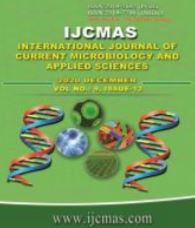


 National Academy of Agricultural Sciences (NAAS)
National Academy of Agricultural Sciences (NAAS)

|
PRINT ISSN : 2319-7692
Online ISSN : 2319-7706 Issues : 12 per year Publisher : Excellent Publishers Email : editorijcmas@gmail.com / submit@ijcmas.com Editor-in-chief: Dr.M.Prakash Index Copernicus ICV 2018: 95.39 NAAS RATING 2020: 5.38 |
From the initial stages of maize improvement, several techniques are being used and developed to overcome the challenge of nutritional food supply. The discoveries from the era of Darwin and Mendel genetics for the evolutionary changes in the crops have guided the development of molecular breeding. Molecular breeding deals with the manipulation of genes, employing different techniques like Quantitative trait loci (QTL) mapping, marker assisted selections, genetic transformations, etc. The foundation of molecular breeding has revolutionized the crop improvement by providing a better understanding about the genetic makeup of desired traits, thereby supplementing the conventional methods to a greater extent. Use of molecular markers, genomic selection (GS), gene discovery and genetic transformations have now become a topic of keen interest for the plant breeders and the crop scientists. The development of varieties with the help of marker-assisted selection (MAS) along with the conventional methods of plant breeding makes us capable to promote the desired gene pool of the cultivars and enhances their agronomic, nutritional and genotypic characters. These genomic selection leads to rapid and lower cost gains in breeding. Genetic transformation is another approach of molecular breeding to transfer desired genes in plants for making them resistant to biotic and abiotic stress, hence increasing the overall crop advancement. Molecular approach of breeding is holding greater importance for the developing countries after accounting successful results in developed ones with similar procedure in its application and use. Some QPM hybrids and resistant cultivars of maize like CM-137, CM-138, CM-139, CM-140, etc.are derived by the use of specific molecular markers, genomic selection of parents and recombination, however, these improved cultivars accounts very less in number.
 |
 |
 |
 |
 |